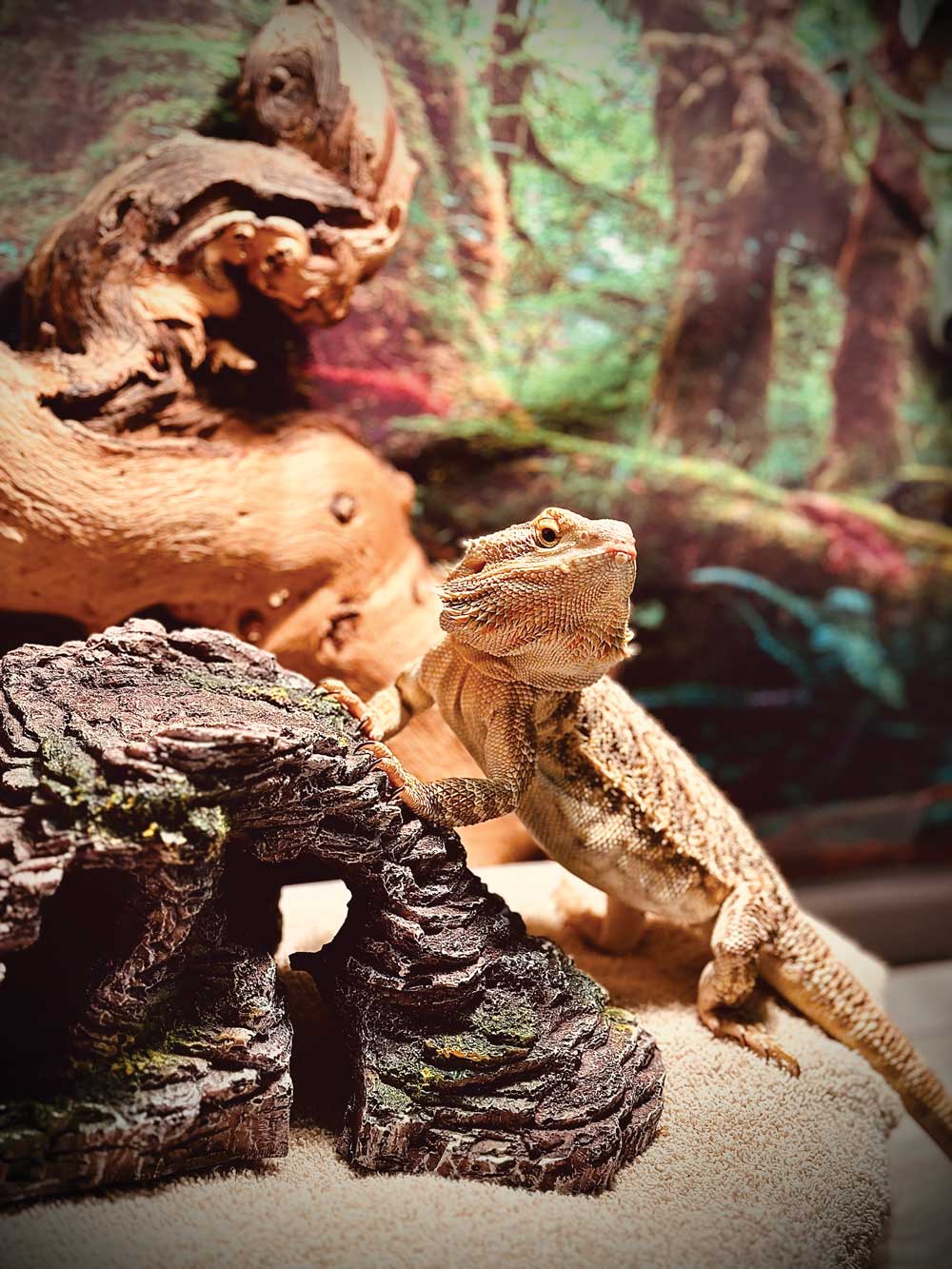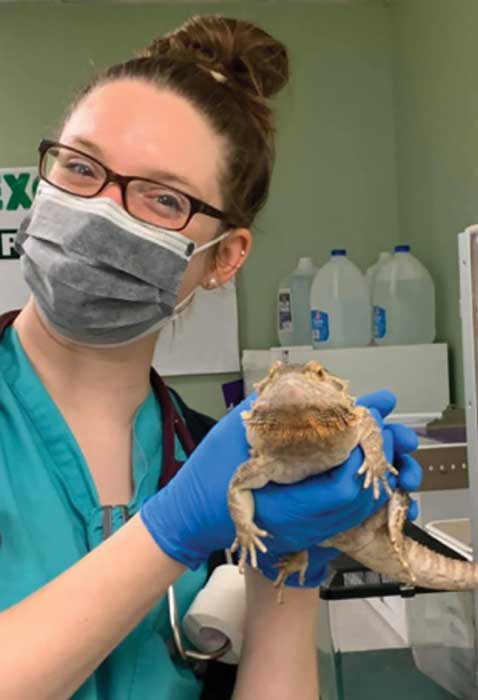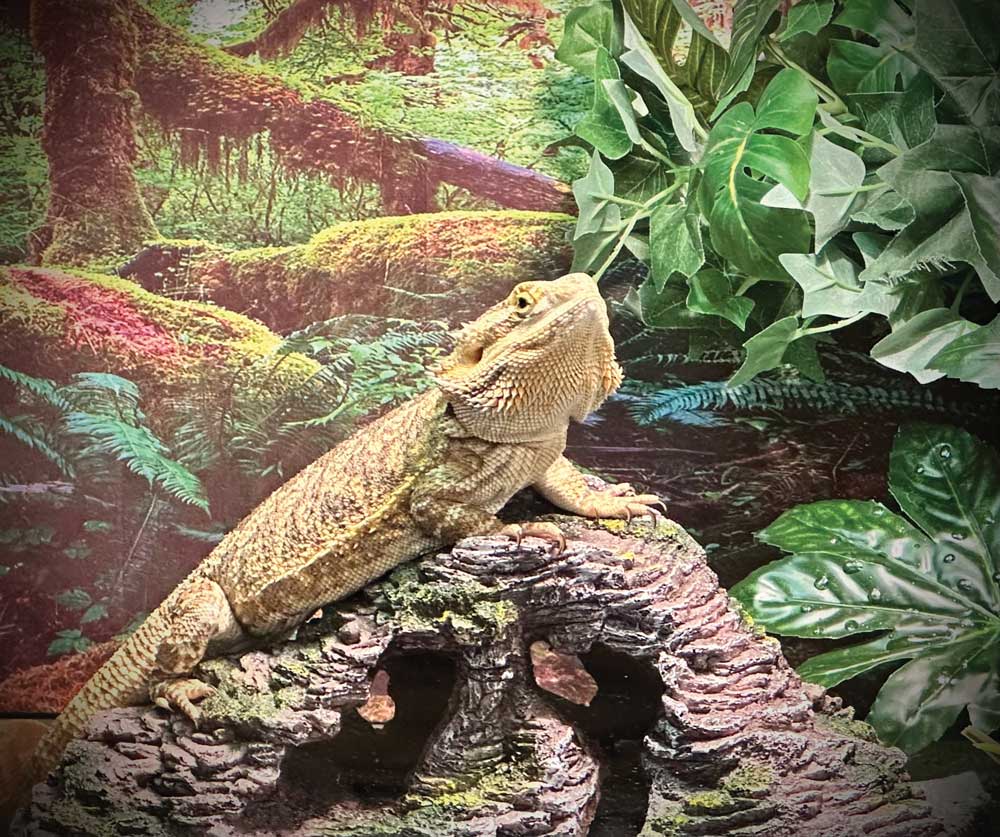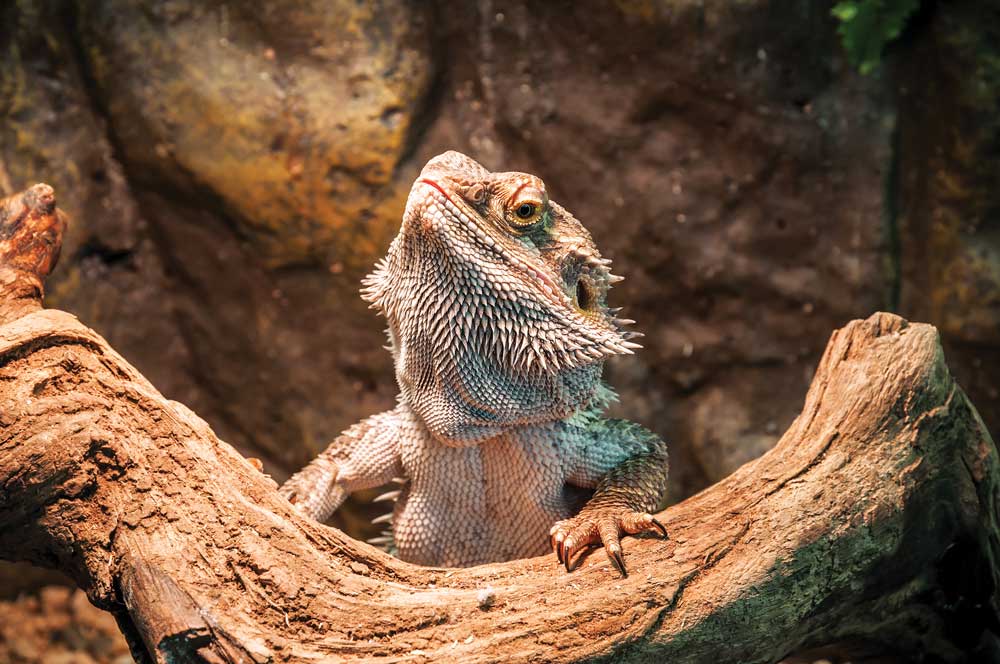If you’re passionate about taking that 10 to 15-year journey with your beardie, insure their health today!
While raising a bearded dragon can be exciting and adventurous, it’s also a long-term commitment that requires passion, understanding, and ongoing care for these scaly, lovable Australian creatures. When I became a first-time reptile owner to a juvenile female beardie, my goal was to provide her with the longest, happiest, and healthiest life possible. This meant prioritizing her health above all else with proper housing, diet, cleanings, and most importantly, wellness checkups with an exotic pet veterinarian. It wasn’t until my beardie’s first wellness checkup that I learned she had a high count of pinworms in her fecal exam and was eligible for illness and injury coverage through exotic pet insurance. As a beginner beardie owner I was not aware prior to that visit that pet insurance existed for reptiles.
When I learned that my beardie would need antibiotics to reduce health risks and repeated fecal tests with this parasite problem, I enrolled her in an affordable pet insurance plan to keep her health protected and my future out-of-pocket vet costs down. To all the beardie owners out there who want to raise their beardies properly from the get-go – seriously consider exotic pet insurance.
What is Exotic Pet Insurance?
Exotic pet insurance is a health insurance policy designed to cover veterinary expenses for non-traditional animals including reptiles, amphibians, birds, fish, and small mammals. Non- traditional animals that are generally excluded from coverage under exotic pet insurance are dangerous, high-risk reptiles such as alligators, crocodiles and some venomous snakes, endangered animals, non-domesticated animals such as lions and tigers, farm animals such as goats, cows and horses since they are typically covered through livestock insurance, and marine life such as sharks, whales, and dolphins.

Ollie the bearded dragon during her morning bask. Photo by Lana Van Demark
Unlike the standard pet insurance that covers dogs and cats who receive veterinary services under a general veterinarian, exotic pet insurance covers veterinary services for these non-traditional animals provided under an exotic pet veterinarian. Exotic pet veterinarians are traditional veterinarians who hold an additional license in exotic pet medicine. Exotic pet veterinarians can treat dogs and cats in addition to exotic pets. Exotic pet veterinarians are generally not found around every corner, so it’s best to research the nearest exotic pet vet to you prior to adopting a beardie.
Why Insure a Bearded Dragon?
The average lifespan of a bearded dragon living in captivity ranges between 10-15 years when properly cared for. These cold-blooded, fragile creatures can develop illnesses and sustain injuries just as much as dogs, cats, and humans can. Some of the most common illnesses and injuries bearded dragons can encounter are parasites, tail rot, mouth rot, fungal infections, respiratory infections, ear infections, eye infections, impaction, Metabolic Bone Disease, Dystocia (egg binding in females), Dysecdysis (abnormal shedding), bone injuries due to accidental falls, and foreign body ingestion. Many of these conditions can develop within the first couple of years of a bearded dragon’s life, especially Metabolic Bone Disease. This is the critical period when beardies require a high-calcium diet, accurate lighting, proper UVB and heating in their enclosure to aid in proper bone and muscle growth.

An adult male Bearded Dragon being examined by staff at Oradell Animal Hospital, Paramus, N.J. – Photo credit Oradell Animal Hospital (released with permission to use by Oradell Animal Hospital.)
Though genetics can be a factor behind some medical conditions, most of these common medical conditions often develop as a result of poor diet, housing, handling, and sanitary conditions during pre- or post-adoption of a beardie. Medical conditions in bearded dragons can sometimes be hard to detect with the naked eye, especially internal conditions if a beardie shows no symptoms, which I learned when my beardie was diagnosed with level four parasites and her wellness visit immediately turned to an illness visit. Although pet insurance is not required for bearded dragons, it is highly recommended so that you as the bearded dragon owner are prepared to protect your pocketbook when you are hit with large, sudden vet bills and can ensure your precious beardie can receive the immediate medical treatment he/she needs.

Ollie on his perch. Photo by Lana Van DeMark
Whether it be surgery, hospitalization, or an emergency room trip consisting of a walk-in fee in addition to multiple tests, procedures and medications, it takes only one time for these types of out-of-pocket vet costs to financially cripple a pet owner. Without medical intervention, these common medical conditions can be life threatening and result in the premature death of your bearded dragon or leave them living an unhappy and unhealthy shortened life comprised of recurring health complications that require ongoing trips to the vet.
Where to Find Pet Insurance for Bearded Dragons
Nationwide and Metlife offer various types of affordable and customizable reimbursement-based exotic pet insurance plans for bearded dragons. Some of these plan options include:
- Wellness
- Wellness/illness/accidents
- Illness/accidents
- Prescriptions
- Emergencies
- Testing and diagnostics
There are specific conditions however that exotic pet insurance companies will not cover which include but are not limited to:
- Pet food/supplements
- Transportation and boarding
- Hereditary conditions
- Grooming (professional nail cutting or cleanings for bearded dragons)
- Birth defects
- Behavioral health medications/behavioral therapy (stress or anxiety disorders in bearded dragons.)
- Waste disposal
- Veterinary services provided during enrollment holding period
- Tax paid on veterinary services prior to reimbursement
- Veterinary services associated with breeding
Regardless of which company you choose to enroll your beardie in, you will be sure to find a plan with affordable monthly premiums, annual deductibles, and reimbursement costs. Discount plans are even offered to new enrollees, as well as enrollees who are military vets, animal facility workers, renewing an annual policy, or want to insure multiple pets. It is up to you as the beardie owner which plan best suits your financial needs, and your bearded dragon will benefit most from.
3 Tips for Bearded Dragon Owners
5 Facts About The Bearded Dragon
For bearded dragons who are raised alongside another bearded dragon, multiple pets or children for example may benefit most from an illness/accident plan, or if a bearded dragon is raised alone by an inexperienced, beginner reptile owner, the beardie may benefit most from a wellness/illness and accident plan. Like all pets, eligibility for coverage for bearded dragons are determined based on age and pre-existing conditions. Some pre-existing conditions may not be covered at the time of enrollment if the insurance company determines the pre-existing condition has not improved or been successfully cured. For a free personalized quote and more information on these plans, visit www.petinsurance.con, or www.metlifepetinsurance.com
The Benefits of Insuring a Bearded Dragon
Insuring my bearded dragon has brought much ease and satisfaction to my life. At an affordable rate of $12 a month, my three-year-old beardie receives wellness, illness and injury coverage through Nationwide with 90% reimbursement after her annual deductible of $100 is met. She has been able to undergo preventative treatments including ultrasounds to monitor her reproductive system for possible Dystocia (egg binding) now that she has reached maturity, and additional fecal exams to monitor her pinworms. She has also received prescription coverage for antibiotics to reduce the risk of gastrointestinal problems from the parasites, and been able to undergo general physicals to ensure her skin, eyes, ears, mouth, bones, and weight remain in healthy status. All claims for her visits have been submitted and reimbursed within a week. She is also guaranteed coverage in all 50 states regardless of what licensed exotic vet clinic she visits, so traveling out of area with her knowing she is always covered is a relief.
Conclusion
Bearded dragons are lovable, yet wild, vulnerable and unpredictable creatures. To commit to them as their owner means researching, understanding, and being observant of the health problems they can encounter at any given moment through their behavior and appearance. It also means putting a plan in place from day one to protect your pocket and your beardie’s health long-term if sudden, recurring medical attention is required. If you’re passionate about taking that 10 to 15-year journey with your beardie, insure their health today!
Lana Van Demark currently resides in Pennsylvania and is the proud owner of a three-year-old female bearded dragon named Ollie. Ollie is a tan, eighteen-inch Central Bearded Dragon who enjoys chilling on her basking rock, exploring her surroundings, and chowing down on collard greens, mustard greens, squash and Superworms. Prior to Ollie she was an amphibian mom to an African Dwarf Frog. In addition to writing for REPTILES magazine, Van Demark has written for Pet Lifestyles/New York Lifestyles Magazine.



